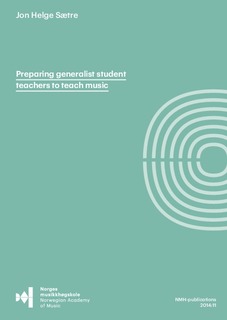Preparing generalist student teachers to teach music. A mixed-methods study of teacher educators and educational content in generalist teacher education music courses
Doctoral thesis
Permanent lenke
http://hdl.handle.net/11250/226772Utgivelsesdato
2014Metadata
Vis full innførselSamlinger
- NMH-publikasjoner [121]
- Ph.d.-avhandlinger [64]
Sammendrag
This study presents knowledge about how generalist student teachers are being prepared to teach music in Norwegian primary and lower secondary schools, by investigating the music courses in undergraduate generalist teacher education and the teacher educators responsible for teaching these courses. When attention is paid to generalist teachers by music education research, the aim is often to investigate the degree to which they feel confident about teaching music. In contrast, few studies investigate the music courses responsible for their teacher preparation, and what conceptions of music, music teaching and musical knowledge and skill are emphasized and transmitted by these music courses and the teacher educators involved.
The study includes three related theoretical and empirical themes. The first aims at describing the teacher educators of music in generalist teacher education, GTE music, and what they perceive to be the main challenges facing GTE music. This description is based theoretically on the work of Bourdieu (1984, 1990). The next focuses on describing and understanding the music courses at a general level, in terms of investigating its structure, content and forms of knowledge, in line with Bernstein’s (2000) notion of recontextualizing. The third focuses on how school music teaching practice is represented, visualized and approximated within GTE music (Grossman, Compton et al., 2009). The research design is a mixed-methods design including both qualitative and quantitative approaches, a choice based philosophically on critical realism (Bhaskar 1998, 2011). Data is collected from ten individual, qualitative interviews with teacher educators from six Norwegian GTE institutions, and from a survey sent to all GTE teacher educators of music. The initial response rate is 74%, and by the use of screening questions, 90 survey respondents (minimum actual response rate 62.9%) were identified as members of the defined population: academic staff at GTE institutions teaching music to one or more generalist student teachers in the period between August 2010 and February 2013. The findings indicate that many teacher educators of music are professionals in a practitioner’s sense, characterized by limited symbolic capital in terms of academic positions and traditional research competence. Their background is characterized not by extensive experience as schoolteachers, but by experience from outside-school settings, professional performance contexts and from teacher education itself. A range of professional sub-identities and positions are identified in the study – the musician, teacher, musical leader, and scholar – creating possible arenas of conflict in the field. The teacher educators report facing two main challenges in their teaching of GTE music: limited time and a number of either formally untrained or informally trained student teachers.
GTE music seems to be recontextualized as a pedagogic discourse (Bernstein, 2000) representing the traditional conservatory model of music studies mainly, evident in the great number of performance and musicology disciplines. The discourse of music didactics is as well a substantial element, while the more research-based model of teacher education is included to a lesser degree. The central forms of knowledge seem to be professional knowledge (produced in, for and about the educational system) and professional practice knowledge (produced by and for practitioners) (Rasmussen & Bayer, 2010). Representations and approximations of both musical practice and school music teaching practice seem to play important roles. What is actually represented and approximated is however a range of different music teaching practices, but musical performance (singing and playing instruments) seem to be given priority. As a result of continuous cutbacks of teaching hours, GTE music seems to have become a highly fragmental and congested yet minute GTE subject. The study has identified important tensions between the teacher educators and the subject of GTE music. On the one hand, the study indicates that the course structure of GTE music (the fragmental conservatory logic) seems to be more conservative than many of the teacher educators involved. On the other hand, the study has identified tendencies of recontextualizing in and transformation of GTE music. One is the academization of GTE music, which is promoted by some and counteracted by others. A second is the move towards an emphasis on the informal domains of pop and rock music and on aural work forms, and the third is the tendency of rendering music and music teaching practice easy and feasible, due to the need for facilitation in low-risk settings demanded by the teacher educators’ perception of the current student teachers as formally untrained.
Beskrivelse
Dissertation for the PhD degree Norwegian Academy of Music, Oslo 2014 - Avhandling (Ph.D.) - Norges musikkhøgskole, 2014
Utgiver
Norges musikkhøgskoleSerie
NMH-publikasjoner;2014:11Beslektede innførsler
Viser innførsler beslektet ved tittel, forfatter og emneord.
-
Musiklærerkompetence mellem teori og praksis
Holst, Finn (NMH-publikasjoner;2011:2, Chapter; Peer reviewed, 2011)Establishing coherence between general pedagogics, subject matter and teaching practice is a well-known and recognized problem in Danish teacher education. The question raised is the relation between theory and practice ... -
Final considerations
Danielsen, Brit Ågot Brøske; Johansen, Geir (NMH-publikasjoner;2012:7, Chapter; Peer reviewed, 2012)In this last chapter we will discuss some of our considerations about how the results of our single studies connect to the overarching research question: How can student music teachers’ learning, and the relevance of music ... -
The professional development of music teachers. Understanding the music teacher as a professional and as a competency nomad
Nielsen, Siw Graabræk; Westby, Inger Anne (NMH-publikasjoner;2012:7, Chapter; Peer reviewed, 2012)The Danish educator John Kreisler (2007) introduced the concept "competency nomad" in order to grasp what it means to be a professional teacher today amidst changes in the dominant conditions of society. This paper discusses ...
